Challenges and Opportunities
In an article published in June 2016 titled “Imagining construction’s digital future” , McKinsey & Company analyzed that “Cost and Schedule Overruns are the norms in the construction sector with projects across asset classes taking 20% longer to finish and up to 80% over budget”. It also concludes that “the construction industry is among the least digitized”.
An infographic analysis published by them in August 2016, showed that “Fewer than 15% of E&C firms had double-digit growth and margins from the years 2000-2015, but they could achieve 25% -30% operating margins if they designed their operations differently”.
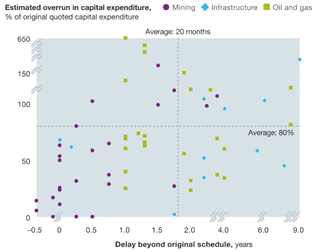
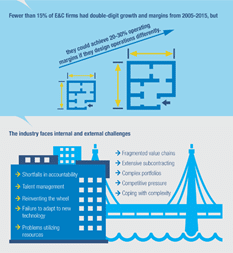
Further, in Deloitte’s 2020 Engineering and Construction industry outlook”, they have analyzed that “earnings before interest and tax (EBIT) is, on an average, just 5.5% of sales”.
Based on our experience spanning more than two decades implementing software solutions in the construction industry, we have arrived at the following conclusions on why companies haven’t achieved efficiency or margin control objectives:
1. Excessive focus on Financial Accounting, HR&Payroll, Purchase Orders and document management functions while ignoring or giving no consideration to harmonizing or controlling core construction functions
2. Lack of integration of construction and plant operations and administrative functions often with over-reliance on inadequately controlled spreadsheets
3. Lack of focus on change and variation control and early visibility of Cost at Completion information that can be mitigated (as required) by delivery teams
4. Lack of focus on addressing inefficiencies and delays in supply chain interaction, more specifically with Subcontractors, that create a substantial cost impact
The underlying theme to these being that any efficiency or margin optimization can occur within a company only if the core operations conducted at project sites is effectively integrated with back-office functions such as finance and accounts, and there is organization-wide adoption of the business system.
Introducing Postmodern ERP in Engineering and Construction
Gartner defines ”Postmodern ERP” as “a technology strategy that automates and links administrative and operational business capabilities (such as finance, HR, purchasing, manufacturing, and distribution) with appropriate levels of integration that balance the benefits of vendor-delivered integration against business flexibility and agility.”
An Administrative ERP Strategy focuses primarily on financials, human capital management and indirect procurement whereas an Operational ERP Strategy would consider software solutions that address actual line of business functions.
The E&C industry is quite unique in terms of its operational requirements as compared to traditional (manufacturing, trading, distribution, banking and financial services etc.) industries where solution vendors have historically focussed. Most of the work is conducted at project/site locations which may last from a month to many years and is further complicated by the underlying complexity of the type of construction work, and the contractual models governing them.
Delays in capturing vital information points in a dynamic and ever-changing environment can prove disastrous for a company, although it is understandable that these issues might occur when systems are weak and site priorities will always be safe and working to meet the client’s programme.
In order to create and deliver value and efficiency, an ERP solution must necessarily address these challenges as well as provide comprehensive capabilities to address its diverse operational needs.
A Postmodern ERP strategy within the E&C industry must therefore necessarily provide wide-ranging capabilities to address project functions in a truly integrated manner with administrative functions in order to deliver real value and benefits of an IT investment.
Defining the End Goal of a Postmodern ERP implementation
To create efficiency and increase value capture (operating margins), the following should be some of the key goals while implementing a Postmodern ERP:
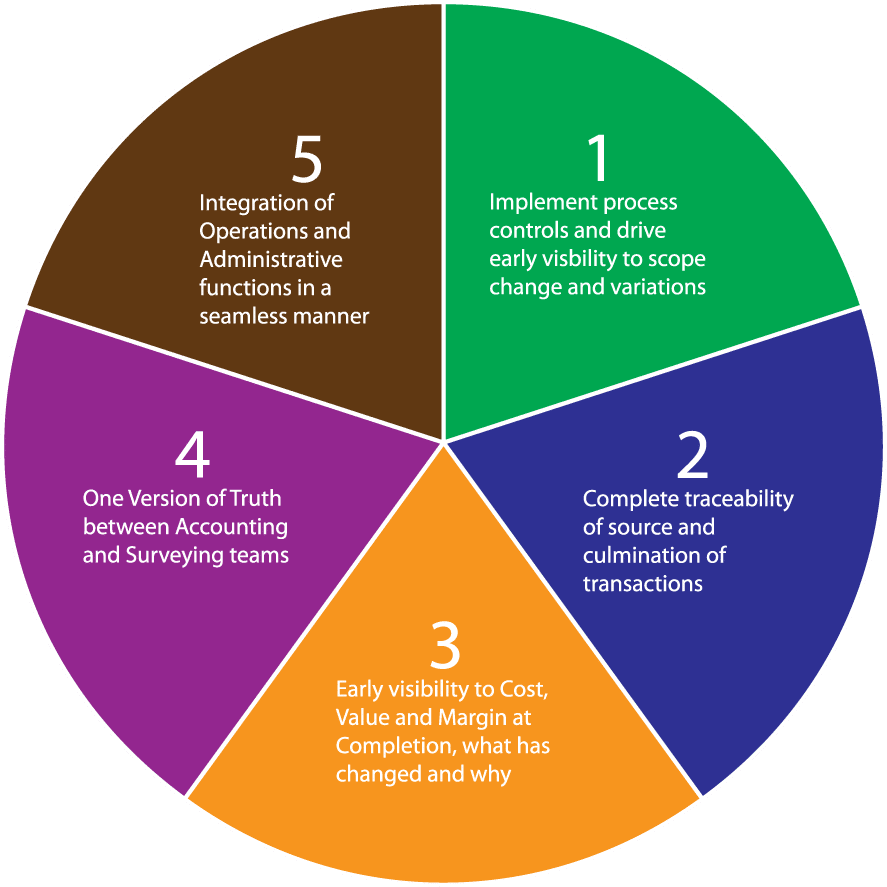
Categorizing Administrative and Operational Functions
The diagram below describes the classification of the business functions of the construction industry that must be addressed by a Postmodern strategy, and the operational functions which if correctly addressed can create and capture significant value.
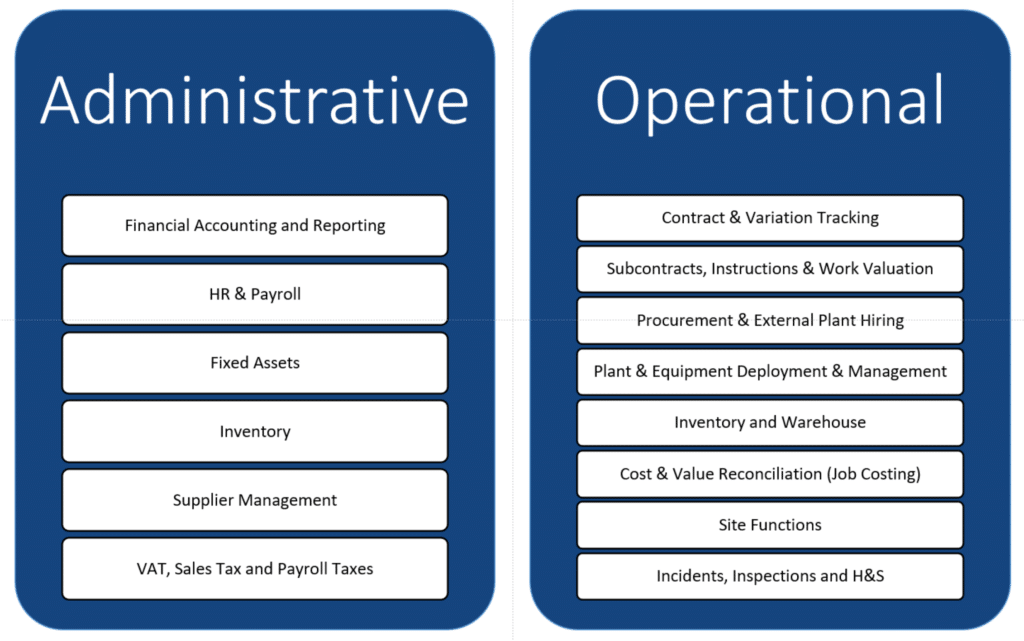
Further Opportunity: Extending Postmodern ERP strategy across the entire Supply Chain
It is a well-known fact that in any construction project, there are a large number of agencies involved comprising subcontractors, vendors, consultants, labour agencies etc. In any construction project, these costs could be anywhere between 40 – 60% of total cost depending on the geography and there are huge inefficiencies in the interaction and transactions between agencies.
Therefore, there exists a huge opportunity to streamline communication, reduce overhead and drive better pricing by extending the Postmodern strategy to encompass the extended supply chain, on a unified platform to support collaborative working.
In our experience this alone can contribute anywhere from 3% – 7% optimization on the cost expended within the external supply chain with the intangible benefit accruing from smoother and more transparent interactions.
Xpedeon: A truly Unified Postmodern ERP platform
A robust, comprehensive and scalable Postmodern ERP platform built specifically for the E&C industry, Xpedeon has been implemented in 5 countries, 21+ construction types and matured over 25+ years. It provides comprehensive administrative and operational capabilities that can address the most subtle nuances of the industry with ease and elegance. An extensive capability and product stack enables companies to undertake true Digital Transformation and drive significant efficiencies and optimize margins. Finally, our complete focus on the industry ensures the product speaks your language backed by extensive implementation experience.
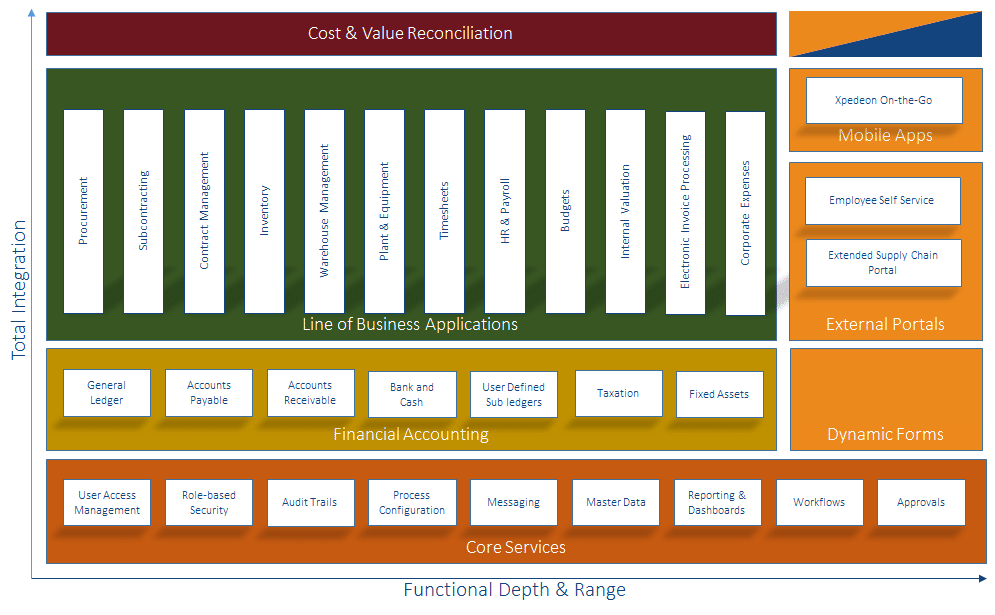
To know more, visit www.xpedeon.com
References:
1. Rajat Agarwal, Shankar Chandrasekaran, Mukund Sridhar “Imagining construction’s digital future”, Capital Project and Infrastructure, June 2016
2. McKinsey & Company Infographic “Imagining constructions digital future”, Aug 2016
3. Michelle Meisels, 2020 Engineering and Construction Industry Outlook, Deloitte
4. Gartner Glossary, Postmodern ERP, https://www.gartner.com/en/information-technology/glossary/postmodern-erp
Share this Post

